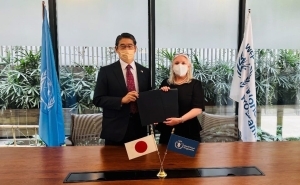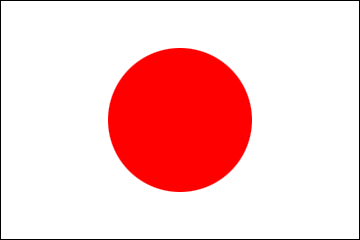Japan and WFP Support Food Security of “Rohingya” and Agricultural Development of Host Communities in Bangladesh
2022/3/2

Dhaka, 2 March 2022- The Government of Japan and the United Nations World Food Programme (WFP) signed an agreement of approximately USD 4.55million to provide food and agricultural assistance to “Rohingya” population and host communities in Cox’s Bazar, as well as Ishwardi and Patuakahali District.
The “Rohingya” population have been in lack of sufficient balanced food, and smallholder farmers in Cox’s Bazar, Ishwardi and Patuakahali District have been facing significant challenges due to the weak agricultural infrastructure and market linkages.
The project will support the local farmers by developing agricultural infrastructures such as irrigation systems, roads, and aggregation centers. It also provides smallholder farmers with training on plague prevention and management of aggregation centers, as well as market research and monitoring to strengthen market linkages.
Euglena, Japanese private company, will conduct technical assistance of productivity and quality improvement of green
beans for local farmers. Euglena will also provide capacity building on food processing to 150 females and youth. This results in ensuring access of “Rohingya” to the balanced food in the camps. Euglena won “Japan SDGs award 2021” for its remarkable contribution to food security and nutrition by utilizing its own and world’s first ever incubation technique of Euglena.
"Japan’s consistent support has helped us to immediately address the Rohingyas' most important needs during these times of increased vulnerability. This new funding for the camps and the surrounding Bangladeshi community is a much needed and very welcome support, especially as the impacts of Covid-19 and climate shocks continue to affect Bangladesh.", said Ms. Jane Pearce, Country Director a.i. of WFP Bangladesh.
“It is imperative to support food security of “Rohingya” population and agricultural situations of host communities in Bangladesh. Following the emergency grant of USD 1million to Bhasan Char announced back in January, Japan decided funding to WFP’s responds in the camps and host communities, understanding the importance of assistance both in Bhasan Char and in Cox’s Bazar. I truly hope that this project will contribute to the better living conditions of both “Rohingya” and Bangladeshi people. Japan will continue to work towards durable solutions including early repatriation to Myanmar, while cooperating with international organizations and NGOs. Finding durable solutions in this crisis will
be conducive to our pursuit of a Free and Open Indo-Pacific.”, said H.E. Mr. ITO Naoki, Ambassador of Japan to Bangladesh.
With this support, Japan’s contribution to “Rohingya” crisis since the large influx in August 2017 reached nearly USD 170million. The project will be implemented in coordination with the Government of Bangladesh and other relevant stakeholders.
